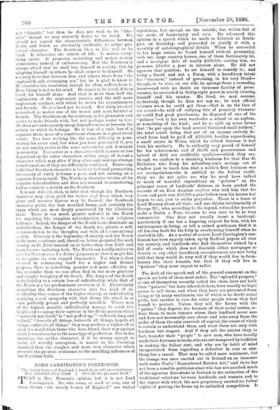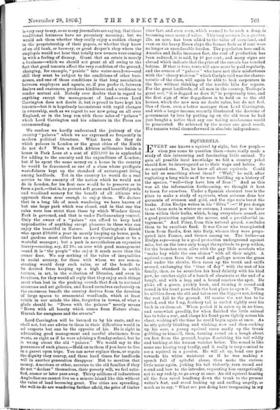LORD CARRINGTON'S CONFESSION.
THAT is Mrs. Hemans's opinion, bat it is not Lord Carrington's. He, who owns, or used to own, one of them thinks "the stately homes of England" are whited sepulchres, fair enough on the outside, but within fall of the seeds of bankruptcy and ruin. He advanced this opinion in a speech which he made to Liberals at South- port on Saturday, and proceeded to justify it with a quantity of autobiographical details. When he succeeded to his large estate, he found himself without personalty, with two large country houses, one of them fortunately let, and a mortgage debt of nearly E400,000, costing him, we presume, 216,000 a year in interest alone. He did not approve that position; he set himself to remedy it ; and being a Smith and not a Percy, with a hereditary talent for "business," instead of governing, in his very blood— though, to be sure, on one side he springs from a crusading house—and with no doubt an immense faculty of perse. verance, he succeeded in thirty-eight years in nearly clearing himself and his estates. He lived, we may assume, moderately, though he does not say so; he took official incomes when he could get them—that is on the face of his record—he sold off outlying bits of property whenever he could find good purchasers; he disposed of one of his "palaces "—it is his own word—for a school or an asylum, or something of the kind ; and he so split up some farms that "he put upon the land several thousand small holders," the total result being that out of an income entirely de- rived from land he paid off £360,000, besides repurchasing a small estate in Wales, which he valued because it had been his mother's. He is evidently very proud of himself for his achievement, and if thrift and perseverance and hatred of debt are creditable qualities—which they are, though we confess to a sneaking kindness for that Duc de Richelieu who flung his schoolboy-son's savings out of window just to teach him that a noble's first business was not accumulation—he is entitled to the fullest credit. Only we do not quite see why he need have talked so much of wasteful expenditure on "palaces" as the principal cause of landlords' distress, or have quoted the account of an East Anglian confritre who told him that his house and park cost f10,000 a year before even his horses had begun to eat, jest to excite prejudice. There is a trace of Lord Marney about all that ; and one thinks involuntarily of George III., who, according to the legend, refused for years to make a Smith a Peer, because he was sure to be so very commercial. One does not usually taunt a bankrupt, particularly if one has a lingering respect for him, with his extravagance in living, or tell a ruined gentleman that it is all his own fault for his folly in overhonsing himself when he started in life. As a matter of course Lord Carrington's con- fession has been eagerly taken up by Radical papers all over the country, and landlords who find themselves ruined by a fall of rents, which does not diminish either mortgages or dowers or any other hereditary encumbrances, are now being told that they would do very well if they would live in farm- houses like their tenants, but that if they will live in " palaces " they must expect to suffer.
The drift of the speech and of the general comment on the speech are both of them most unfair. The" splendid paupers," as one of themselves recently called the class, have not built their "palaces," but have inherited them, have usually no legal power to sell them, and when they have are prevented from doing so by many sentiments, one of which is no doubt social pride, but another is care for other people whom they feel bound to protect. Unless they sell the farms with the " palace " they deprive the farmers of their social centre, re- duce them to mere tenants whom their landlord never sees and does not necessarily care about, and take away from the midst of them the only reservoir of capital, the owner of which is certain to understand them and treat them not only with kindness but respect. And if they sell the estates they, in fact, transfer their " people " to new men, who have usually made their fortunes in trade, who are not hampered by tradition in seeking the fullest rent, and who are by habit of mind incapacitated from regarding a defaulter in rent as any- thing but a. rascal. That may be called mere sentiment, but the change was once carried out in Ireland on an immense scale under Peel's " Enoumbered Estates Act," and there has not been a sensible politician since who has not ascribed much of the agrarian discontent in Ireland to the extinction of the traditional relations between landlords and tenants, and to the vigour with which the new proprietary exerted its fullest rights of putting the farms up to unlimited competition. It
is very easy to say, as so many journalists are saying, that those traditional leniences have no pecuniary meaning; but we would ask them whether they really enjoy a sudden change in the proprietorship of their papers, or whether they know of an old bank, or brewery, or great draper's shop where the employ& would not hear that totally new owners were coming in with a feeling of dismay. Grant that an estate is merely a business—which we should not grant at all owing to the fact that good tenants affect the very condition of the ground, changing, for example, " prairie " into water-meadows—and still they must be subject to the conditions of other busi- nesses, and one of those conditions is that long association between employers and agents, or, if you prefer it, between dealers and customers, produces kindliness and a readiness to render mutual aid. Nobody ever doubts that in regard to anything except the management of land— even Lord Carrington does not doubt it, but is proud to have kept his tenants—but it is hopelessly inconsistent with rapid changes in ownership, such as we regret to see now going on all over England, or in the long run with those sales of " palaces " which Lord Carrington and his admirers in the Press are recommending.
We confess we hardly understand the jealousy of the country palaces" which we see expressed so frequently in modern political literature. What harm do they do which palaces in London or the great cities of the North do not do ? When a South African millionaire builds a house in Park Lane at a cost of 2250,000 he is applauded for adding to the amenity and the expenditure of London ; but if he spent the same money on a house in the country ie would be denounced as one of a class whose profligate wastefulness kept up the standard of extravagant living among landlords. Yet in the country he would do a real service to the amenity of the nation which he would not do in London, for his first care would be to preserve or to form a park,—that is, to protect soft grass and beautiful ponds and woodland scenery for the benefit of all citizens who approach them near enough to enjoy them. We declare that in a long life of much wandering we have known of but one large park which was closed, and in that one the rules were less strict than those by which Windsor Great Park is governed, and that is under Parliamentary control. Only the owner of a " palace " can afford to keep land unproductive of anything except pleasure to those who can enjoy the beautiful in Nature. Lord Carrington's friend who spent 210,000 a year in merely keeping up house, park, and gardens must either have an exceptional place or be a wasteful manager ; but a park is nevertheless an expensive luxury—costing, say, 22 10,4 an acre with good management —and it is "the people" who enjoy it much more than the -owner does. We say nothing of the value of inequalities in social scenery, for those with whom we are remon- strating would deny such value, or of the benefit to be derived from keeping up a high standard in archi- tecture, in art, in the collection of libraries, and even in furniture, for they would all reply that they enjoy such things most when lost in the pushing crowds that flock to national museums and art galleries, and found ourselves exclusively on the enormous benefit the country derives from the devotion of large spaces to ornamental woodlands, which at least retain in our minds the idea, forgotten in towns, of what a glade should be. "Down with the palaces" merely means "Down with all beauty which comes from Nature alone. Hurrah for smugness and the streets."
Lord Carrington will be listened to by his caste, and we shall not, but our advice to them in their difficulties would in ad respects but one be the opposite of his. He is right in advocating good management and careful abstinence from waste, as right as if he were advising a Sunday-school, but he is wrong about the -old "palaces." We would say to the possessors of such places,—Hold on to them if you have to live in a garret upon tripe. You can never replace them, or regain the dignity they convey, and these hard times for landlords will in another generation disappear. Not to mention that money, American or other, accretes to the old families if they do not "declass" themselves, their poverty will, we feel satis- fied, sooner or later pass away. Thirty millions of industrious Anglo-Saxons cannot live on a minute island like this without the value of land becoming great. The cities are spreading, the well-to-do are wandering farther afield, the price of timber rises fast, and even corn, which seemed to be such a drug, is becoming once more of value. This very autumn 7s. a quarter, 21s. an acre, has been added to the value of corn-land, and even on the heavy Essex clays the farmer feels as if rent were no longer an unendurable burden. The population here and in America and India increases fast, the cost of production has been reduced, it is said, by 40 per cent., and many signs are abroad which indicate that the price of the cereals has touched bottom. If that is true, rents will once more be paid regularly, and the owners of "palaces" who have met their misfortunes with the "cheery stoicism" which Carlyle said was the charac- teristic of the class, will again be able to look carpenters in the face without thinking of the terrible bills for repairs. For the great landlords, of all men in the country, Trollope's great mot, "it is dogged as does it," is perpetually true, and the first sign of wise doggedness is to hold on to the old houses, which the new men no doubt value, but do not feel. One of them, even a better manager than Lord Carrington, and with a larger income, recently illustrated the doctrine of government by love by putting up on the old trees he had just bought a notice that any one taking mushrooms would be prosecuted. He achieved by the notice one good result. His tenants; voted thenceforward in absolute independence.











































 Previous page
Previous page